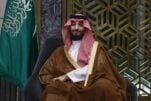
The establishment of the Gulf Cooperation Council (GCC) is inseparable from the overall regional political challenges that faced all its member states when the council was established in May 1980.
A year before, on the eastern bank of the Persian Gulf, Iran witnessed an Islamic revolution that overthrew the Pahlavi royal regime, which had ruled it since 1925. That raised the concerns of the several royal Gulf regimes, fearing a probable similar fate. Then the Gulf states’ concerns grew that this regime might export its revolution to neighbouring countries.
The leader of the Islamic Revolution himself – Imam Ayatollah Ruhollah Khomeini – openly declared his theory to spread this model in the world through the concept of Wilayat al-Faqih. In short, the Gulf states viewed the Iranian revolution as an existential threat, especially if it revived the agenda of political Islam in the region.
In practice, the Gulf states had other concerns about the revolutionary political Islam projects. And with a Sunni discourse addressing the Sunni Gulf residents, the Muslim Brotherhood paved the way for those projects in the Arab world.
The first conflict between the Muslim Brotherhood and the Gulf monarchies happened after the Sunni group welcomed the Islamic Revolution. That highlighted the Gulf states’ concerns after the revolution in Iran, mainly because of their intersection with the projects of Sunni political Islam.
Political dangers surrounded the Gulf states from all sides in the early 1980s, including the ambitions of the new revolutionary Islamic regime in Iran, and the awakening of political Islam’s projects, to Sadat’s ventures and the polarisation it provoked. Then the Iran-Iraq war confirmed the possibility of all these contradictions erupting.
In these circumstances, establishing the Gulf Cooperation Council allowed the Arab Gulf to unite and face these challenges, especially after the Arab League failed to play this role after the intense divisions that followed the Egyptian-Israeli peace treaty.